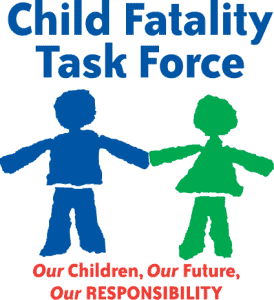By Kella Hatcher
 Few things in life, if any, are more heart-breaking than a child’s death, particularly one that could have been avoided. Thankfully, there is a unique group in North Carolina, the North Carolina Child Fatality Task Force (CFTF), with a 25-year track record of recommending public policies that save children’s lives.
Few things in life, if any, are more heart-breaking than a child’s death, particularly one that could have been avoided. Thankfully, there is a unique group in North Carolina, the North Carolina Child Fatality Task Force (CFTF), with a 25-year track record of recommending public policies that save children’s lives.
The CFTF was created twenty-five years ago after an alarming report on child maltreatment fatalities in North Carolina was published showing that such deaths may be more common than realized. The news media picked up on it, and a bipartisan group of legislators and state agency leaders worked with national experts to create the North Carolina Child Fatality Prevention System, of which the CFTF is a critical component.
Since the 1991 creation of the CFTF and the broader system of local and state teams that review child deaths, the North Carolina child death rate has decreased by 46 percent. Had the death rate stayed the same as in 1991, North Carolina might have seen an estimated 16,400 fewer children reaching adulthood during those 25 years.
There are many factors that have contributed to this 46 percent decrease, and the CFTF advancement of policies that focus on the safety and well-being of children has certainly played a role. The CFTF brings together agency heads, legislators, experts in child health and safety, and community volunteers to learn about, discuss, and recommend policies and funding that can save children’s lives. The structure of this group is unique, and in many, if not most, states there is no such equivalent.
Over the years, the CFTF has been the locus for multiple policy changes and funding decisions that have played an important role in reducing child mortality. The CFTF has successfully recommended and implemented basic safety requirements, such as mandatory seatbelt and bicycle helmet use, child car safety and booster seats, ATV regulations, and requirements for smoke and carbon monoxide alarms. The CFTF also worked in conjunction with state agencies to develop the graduated driver license program to address high rates of youth driving deaths; North Carolina was the second state in the nation to enact such a program. Throughout its tenure, the CFTF has successfully recommended policy changes and funding to bring down North Carolina’s persistently high infant mortality rate and to address child maltreatment.
A commitment to the prevention of child deaths is a bipartisan issue. Thus, it is no surprise that most evidence-based recommendations from the CFTF have been implemented no matter which party held a majority.
This track record of success is part of the reason I came to the CFTF as executive director in 2015. Previously, I worked in juvenile law and years ago had the privilege of working for the very first chair of the CFTF, the late Ilene Nelson who was one of the smartest and most passionate child advocates I’ve ever met. She and the other founders of the CFTF deserve our gratitude. They recognized that North Carolina’s children and families deserved a group of experts and lawmakers with a singular focus on leveraging the power of statewide policy and funding to save children’s lives.
Today, the CFTF continues its examination of critical factors that contribute to child deaths such as the rapid rise of prescription drug abuse, tobacco use during pregnancy, and youth suicide. It also has developed a better understanding of how social issues such as poverty, education, and childhood trauma impact mortality rates. As we look forward to the next 25 years, though the landscape has changed, our mission remains the same—advancing public policy to save children’s lives.
Kella Hatcher is the executive director of the North Carolina Child Fatality Task Force.
